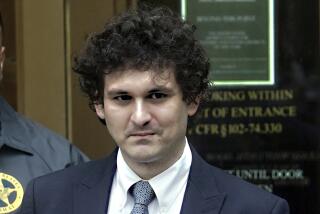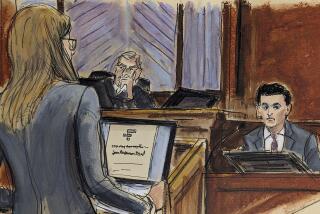Outcome May Aid Prosecutors of Enron
- Share via
NEW YORK — The guilty verdict in the trial of Arthur Andersen on Saturday puts momentum and morale back on the federal government’s side in its Enron Corp. prosecution, though a tough effort still lies ahead, legal experts said.
Although the outcome was far from the slam dunk that some had forecast when the obstruction-of-justice indictment was handed up, the win for prosecutors gives them important leverage in recruiting potential witnesses against Enron, experts said.
“Despite this being more hard-fought than expected and that it took longer, I think it also came out better than expected for the government,” said Stephen L. Meagher, a former federal prosecutor now representing white-collar criminal defendants at San Francisco law firm Phillips & Cohen.
The government is expected to devote its full attention to the prosecution of Enron, once the dominant energy trading company that had captured the frenzy of investors in the deregulation of the electricity and natural gas business. But last year, the company melted down after it disclosed that some of its past profit was an illusion. An internal report later disclosed that senior executives had made millions of dollars in deals with partnerships that did business with the company.
Former Enron Chairman Kenneth L. Lay, former Chief Executive Jeffrey K. Skilling and former Chief Financial Officer Andrew Fastow are under investigation by the Justice Department to determine whether they misled investors or committed financial fraud.
The government probably will try to maintain its momentum from the Andersen verdict by securing an indictment against Enron within the next six to eight weeks, said John J. Fahy, a partner in Newark, N.J., law firm Reed Smith.
Fahy, who previously worked as a federal prosecutor with Michael Chertoff, the assistant attorney general overseeing the Enron prosecution, said Chertoff’s style is to be “as fast and as streamlined as possible.”
“He will try to find a way to explain who did what as simply as possible, and he’s not going to wait a year for everything to fall into place,” Fahy said.
The most significant benefit for the prosecution from its Andersen conviction, in Meagher’s view, is that the testimony provided “a road map to practices that Arthur Andersen partners thought was misleading.”
One such partner is Carl E. Bass, a member of Andersen’s Professional Standards Group, the unit that advises field auditors on complex accounting questions.
Bass testified that he and other members in the standards group clashed with Andersen’s Enron audit team over the propriety of some transactions in which Enron tried to conceal debt through the use of limited partnerships.
On the other hand, testimony by David B. Duncan, the government’s star witness and leader of Andersen’s Enron audit team, may make it more difficult to prove former Enron officials conducted securities fraud or insider trading of company stock or filed false financial statements, experts said.
Duncan testified he believed that some of Enron’s most controversial practices--including the use of limited partnerships to boost Enron’s profit and shift debt off its books--were legal and appropriate.
With that opinion in their pockets, defense lawyers could rebut charges that the official financial statements they filed with the government contained false information of a “material” nature--generally defined as having an impact of 5% or more on the company’s net worth, said Christopher J. Bebel of Houston law firm Shepherd, Smith & Bebel.
But Duncan also aided the government’s cause by testifying that Enron officials concealed things from Andersen, noted Bebel, a former federal prosecutor and securities regulator.
For instance, Duncan testified that he wasn’t told about a side deal between Enron and Fastow that essentially guaranteed Fastow would not lose money on investments in several of the limited partnerships.
Such an arrangement would mean the partnerships were not independent of Enron and therefore not eligible for the off-the-books accounting treatment they were given.
Another deal concealed from Duncan, he testified, involved a partnership called Southampton Place.
According to the report of a special internal investigation by Enron’s board last fall, Fastow and aide Michael J. Kopper each turned a $25,000 Southampton investment into a $4.5-million gain in a few months in 2000. And Enron lawyer Kristina Mordaunt made $1 million on a $5,800 investment, the report said.
Prosecutors could use evidence that Enron concealed important information from Andersen to show that Enron’s management “intentionally engaged in deceptive and deceitful practices,” Bebel said. Such behavior, if it had been brought to light, would have threatened Enron’s regulatory licenses as an energy merchant and therefore was “material” to the firm’s financial standing, he added.
E. Lawrence Barcella, a Washington-based attorney for Paul, Hastings, Janofsky & Walker, was less sanguine about the value of the prosecution’s Andersen victory.
“The government going in considered this an extremely strong case, but they only won by their fingernails,” Barcella said. “Seeing what should have been a strong case take the turns it did won’t embolden them with Enron.”
More to Read
Inside the business of entertainment
The Wide Shot brings you news, analysis and insights on everything from streaming wars to production — and what it all means for the future.
You may occasionally receive promotional content from the Los Angeles Times.










